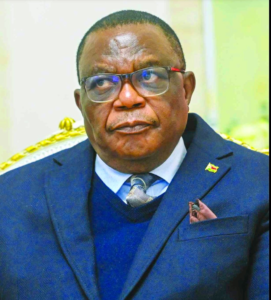ZIMBABWEAN OPPOSITION LEADER’S FIGHT FOR JUSTICE: A BEACON OF HOPE IN THE STRUGGLE FOR FREEDOM OF EXPRESSION

In a significant move that has drawn the attention of observers both within and beyond Zimbabwe’s borders, Job Sikhala, a leading figure in the opposition, has initiated an appeal against his conviction and subsequent sentencing. Sikhala faced charges under section 31a(iii) of the Criminal Law (Codification and Reform) Act (Chapter 9:23) for allegedly publishing or communicating falsehoods prejudicial to the state. This case has become a focal point in the ongoing debate over freedom of expression in Zimbabwe, highlighting the nation’s complex battle for democracy and human rights.
The court ruled that Sikhala must pay a fine of US$500 or alternatively face two months of imprisonment. Additionally, he received a nine-month prison sentence, which was fully suspended for five years on the condition he does not commit a similar offense. This judgment has ignited extensive discussions regarding the current state of democracy and human rights in Zimbabwe, suggesting that Sikhala’s case is emblematic of a broader narrative of political suppression and the lengths individuals are willing to go to defend their beliefs and the right to freely express them.
Sikhala has been a relentless critic of the ruling party, and his legal troubles began following his vocal condemnation of the brutal killing of Moreblessing Ali, an opposition activist. Ali’s murder, allegedly by her former boyfriend, a Zanu PF supporter who has since been sentenced to 30 years in jail, sparked widespread outrage and shed light on the dangerous conditions political activists face in Zimbabwe. Sikhala’s arrest and his subsequent 595 days in pretrial detention at Chikurubi Maximum Security Prison for incitement of public violence highlight the risks encountered by those who challenge the prevailing power dynamics.
The appeal against his conviction transcends a mere legal dispute; it signifies Sikhala’s relentless resolve to confront what he views as governmental injustices against its detractors. This case underscores the delicate balance between safeguarding national security and protecting the fundamental human right to freedom of expression. The employment of section 31a(iii) of the Criminal Law (Codification and Reform) Act to secure Sikhala’s conviction poses serious questions about the legislation’s application and its capacity to suppress dissenting voices.
Sikhala’s case emerges amid heightened scrutiny of Zimbabwe’s human rights record on the international stage. Critics argue that the government’s stance against opposition figures like Sikhala is reflective of a wider effort to quell dissent and mute opposition voices, especially in the lead-up to elections. Conversely, the government asserts its commitment to upholding the law and safeguarding the state against potentially destabilizing falsehoods.
As Sikhala’s appeal process progresses, it stands as a critical test for Zimbabwe’s judiciary and its autonomy. It represents a beacon of hope for those who trust in the legal system’s ability to address injustices and uphold justice. However, it also serves as a stark reminder of the hurdles that lie in the path toward achieving a more democratic and equitable Zimbabwe.
The anticipation surrounding the outcome of this appeal is palpable, not just as a judgment on Sikhala’s personal fate but as an indicator of Zimbabwe’s dedication to human rights and adherence to the rule of law. As the international community watches closely, Job Sikhala’s case symbolizes the enduring struggle for justice, freedom, and the right to dissent in a nation at a pivotal moment in its history.




The appeal process offers a chance for the judiciary to reaffirm its role in ensuring accountability and justice. A fair and transparent handling of Sikhala’s appeal could help restore public confidence in the legal system and its ability to act as a check on governmental power. Job committed no crimes and if this appeal does not reverse the judgement then our judicial system is flawed.
Zimbabwe’s human rights record, as highlighted by Sikhala’s case, warrants close examination and improvement. The government should commit to protecting the rights of all citizens, including political activists and opposition members, to strengthen its democratic credentials on the international stage.
Sikhala’s conviction under section 31a(iii) of the Criminal Law (Codification and Reform) Act raises critical concerns about the balance between national security laws and the protection of free speech. Laws that broadly criminalize the act of publishing or communicating falsehoods could be prone to abuse and might suppress legitimate dissent and criticism. It’s essential for Zimbabwe to review and potentially reform such legislation to ensure it does not infringe upon fundamental human rights.
The circumstances surrounding Sikhala’s arrest, pretrial detention, and the charges against him are emblematic of a broader issue of political repression in Zimbabwe. It’s crucial for the government to differentiate between genuine threats to national security and the legitimate exercise of free expression. Engaging in dialogue with opposition figures and respecting dissenting voices are hallmarks of a healthy democracy.